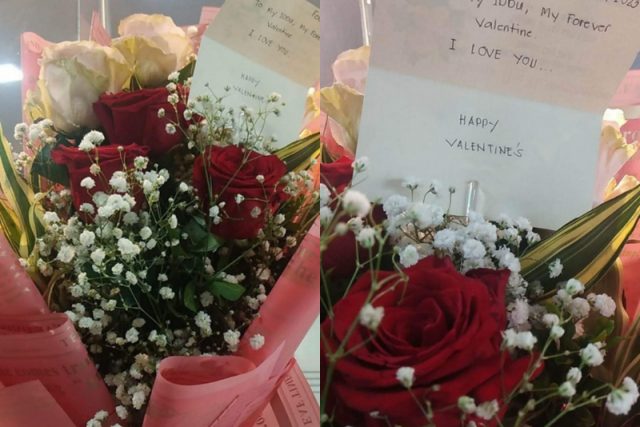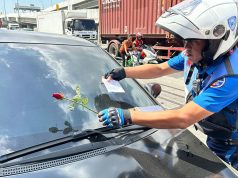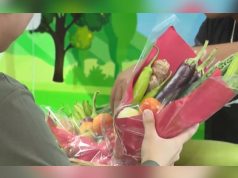
They got the wrong Grace.
A woman sought the help of the Baguio Public Information Office (PIO) after wrongly receiving a flower bouquet on the Day of Hearts due to the similarity of their first names.
The office on Tuesday shared that Grace Mendez, one of its page followers, approached them to help her locate the misdelivered bouquet intended for another Grace.
“Wrong delivery… Pakihanap na lang sa Baguio kung sino po ‘yung mag ‘IDDU’ [diyan],” Mendez said in her message.
“Kawawa naman, ‘di niya matanggap flowers niya. Nasa BHF PAWNSHOP LOWER SESSION ROAD po ‘yung flowers, paki-claim na lang… (laughing-with-tears emojis) Seryoso po ito,” she added.
According to Mendez, the delivery personnel did not mention the recipient’s last name. This led her to assume it was from her husband since it was Valentine’s Day.
“Kapangalan ko po… ‘Di sinabi apelyido… Tinawagan ko asawa ko po, mangiyak-iyak pa ako mag-thank you, hindi pala sa akin..” Mendez was quoted as saying by Baguio PIO.
“Inaway pa ako (ng asawa ko) sabi, baka may secret admirer ako (laughing-with-tears emojis) kaya sabi ko… Salamat sa mag- ‘IDD.’ Sana masaya kayo, sinira niyo araw ko! (raised arms emojis),” she reportedly added in jest.
The bouquet featured an arrangement of red and white roses with a card that reads: “To my IDDU, My Forever Valentine. I LOVE YOU… HAPPY VALENTINE’S”
“Iddu” is an Ibanag word that directly translates to “mahal” in Filipino. It means “loved one” or “beloved” in the Ibanag language usually spoken in the provinces of Cagayan and Isabela.
“OOPPS, WRONG DELIVERY,” Baguio PIO said in its post.
The post has earned over 1,500 likes, laughing reactions and more than 190 comments.
Baguio PIO, later on, said that the bouquet was rightfully delivered to its intended recipient following the initiative.
“… AND THEY LOVED HAPPILY EVER AFTER. Update ni Ms. Mendez sa flowers na paasa (grinning emoji) Happy Valentine’s Day to all!” it said, sharing screengrabs of Mendez’s messages to them.
Mendez shared that the delivery personnel explained to her what had happened after the initiative to locate the correct recipient reached social media.
“Sabi niya, kay Ma’am Grace sa Lower Session Road po dapat i-deliver… sabi ko Grace din po ako sa Lower Session Road… kaso sa ibang office po siya… sa tabing building po namin… sa may Peliz Loy po dapat i-deliver ‘yung flowers. May Grace din daw po doon…” she told Baguio PIO.
Symbol of love
On Valentine’s Day, lovers usually bestow their beloveds with gifts such as flowers, chocolates, and other tokens to express their love.
Experts said roses, specifically, began to be associated with romance during the Victorian era in England.
In this era, women were expected to learn the “language of flowers” or the notion that each and every flower has its own meaning.
Books about such a concept circulated in England throughout the 19th century, with the rose often associated with “love.”
“Who that ever could sing has not sung the Rose! The poets have not exaggerated its beauty, or completed its panegyric,” an excerpt from the “Langauge of Flowers” by Charlotte de Latour reads, as quoted by TIME Magazine.
“Nature seems to have exhausted all her skill in the freshness, the beauty of form, the fragrance, the delicate color, and the gracefulness which she has bestowed upon the Rose,” she wrote.
Roses became a symbol of “capricious beauty,” with stories and poems pointing to the flower’s perceived lasting emotional power.
The trend continued until modern society adopted the symbolism and ingrained it into their lives.









